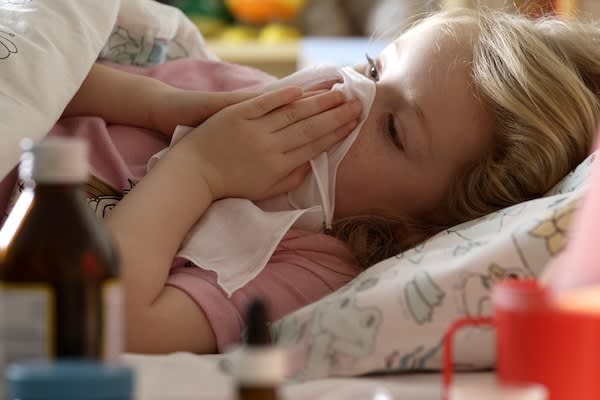Recognizing RSV: Signs and symptoms

[4 MIN READ]
In this article:
-
Respiratory syncytial virus (RSV) is a common respiratory virus that can cause severe complications in infants and older adults, including hospitalization. It spreads through airborne droplets and can survive on surfaces, making it highly contagious.
-
Recognizing the symptoms of RSV and knowing when to seek medical help is crucial, especially for vulnerable individuals such as infants and older people.
-
A family medicine doctor at Providence discusses RSV symptoms, treatment and prevention and shares tips to help you protect your family from infection this RSV season.
It survives for hours on crib rails and high chairs. It lives on soft surfaces such as your hands, face and the tissues you’re using at an alarming rate. It's one of the most common childhood illnesses. However, it also affects adults and is particularly dangerous for older people with weakened immune systems.
Is this the description of the evil villain in a comic book or a black-and-white movie? No. It’s the respiratory syncytial virus (RSV).
What is RSV?
“RSV is a common respiratory virus. Most people are exposed to it as children, where it typically causes a cold-like illness. However, in infants and toddlers, RSV can lead to more severe complications due to the size of their bronchioles,” says Robert Lichfield, D.O., a family medicine doctor at Providence Urgent Care – Providence Medical Park.
Your lungs contain airways called bronchioles, which deliver air to the spongy tissues where gas exchange occurs. RSV targets the bronchioles, leading to inflammation and blockages that make breathing difficult, especially for babies and toddlers.
“Their small airways become obstructed, preventing air from reaching the spongy tissues. That’s why RSV is particularly dangerous in young children,” explains Dr. Lichfield.
According to the National Institutes of Health (NIH), certain people are at higher risk of severe RSV infection or complications, including:
- Infants
- Adults 64 and older
- People with chronic health conditions, such as lung or heart disease
- People with weakened immune systems
“Older children and adults generally recover from RSV without serious issues, but the virus can still cause severe illness in elderly individuals – especially those with compromised lung function or chronic conditions like heart or kidney disease. These individuals may lack the reserve capacity to cope with an infection, making RSV more dangerous for them,” he adds.
How does RSV spread?
In most areas, RSV infections start in the fall and peak during the winter. People with RSV are typically contagious a day or two before they show symptoms and can continue sharing the infection for three to eight days. Infants and people with weakened immune systems may continue to spread RSV for up to four weeks, according to the Centers for Disease Control and Protection (CDC).
RSV is an airborne disease. You may become infected if:
- Someone with RSV sneezes or coughs near you
- Virus droplets from a cough or sneeze get in your mouth, eyes or nose
- You make direct contact with someone who has the virus
- You touch something with virus particles, such as a doorknob, and then touch your face before washing your hands
Signs and symptoms of RSV
Symptoms of RSV vary in older children, adults and babies. Signs usually start four to six days after infection and clear up within two weeks. RSV infection tends to be mild at its start, but it becomes more severe after a few days. In some cases, you may have a lingering cough after your other symptoms are gone.
Common symptoms in children
Early warning signs for RSV in children older than six months may include:
- Runny nose
- Lack of appetite
- Drinking less
- Cough
- Trouble breathing and wheezing
In very young infants less than six months old, the symptoms of RSV may also include:
- Irritability
- Decreased activity
- Pauses in breathing for more than 10 seconds (apnea)
RSV in adults: What to watch for
Symptoms in adults are similar to those in children, including:
- Congestion
- Decreased appetite
- Coughing, wheezing or trouble breathing
- Fever
RSV can be particularly damaging to adults 60 and older, especially if they:
- Are 75 years of age and older
- Have chronic health conditions, such as heart disease, kidney disease or diabetes
- Have a weakened immune system
- Live in a nursing home
When to seek medical help
Since RSV can be so dangerous, it’s important to understand how to choose between the ER, urgent care, telehealth and your primary care doctor.
According to the NIH, the following symptoms should cause you to seek emergency care if you or your child:
- Have difficulty breathing
- Have trouble eating or drinking
- Experience chest pain or pressure
- Experience sudden dizziness or confusion
- Have worsening symptoms
The difference between RSV, flu and COVID
Fever, sore throat and a cough can all be symptoms of RSV, the flu or COVID-19, which can make it difficult to know what type of care you need. To make it even more challenging, all three of them are contagious and spread easily from person to person.
In general:
- RSV has cold-like symptoms, including cough, sneezing, runny nose, congestion and sometimes a fever.
- RSV tends to affect young infants and toddlers with symptoms that affect their lungs, including wheezing, fast breathing and respiratory distress.
- The flu typically starts with a fever that comes on rapidly, causing chills, body aches and loss of appetite.
- COVID-19 often includes a loss of taste or smell.
Treatment and care for RSV
Most hospitals, clinics and doctor’s offices can test for RSV using a fluid sample taken from your nose with a cotton swab. Mild RSV usually goes away without treatment after a week or two. Antibiotics kill bacteria, not viruses, and don’t work on RSV.
To get relief, the NIH suggests you:
- Take acetaminophen or ibuprofen to reduce fever and relieve achy muscles. Never give aspirin to children.
- Stay hydrated by drinking plenty of fluids.
- Always check with your child’s healthcare provider before giving them any over-the-counter medications.
Prevention tips
“While it’s important to be cautious, it’s equally important not to live in fear or isolate excessively. Prevention is the best way to avoid missing work or suffering through a week-long illness,” says Dr. Lichfield.
These tips from the CDC can help you stop the spread of RSV:
- Wash your hands often with soap and water for at least 20 seconds.
- Avoid touching your nose, face or mouth with unwashed hands.
- Avoid close contact with others if you are sick or if they are sick.
- Clean and disinfect frequently touched surfaces.
- Cover sneezes and coughs with a tissue. Throw it away and wash your hands when done.
- Stay home when you’re sick.
RSV vaccines
Immunization helps protect children and older adults from severe illness or complications from RSV infection.
According to the NIH, the vaccine is recommended for:
- Infants born during or entering their first RSV season while younger than 8 months
- Children ages eight through 19 months who are at high risk for severe RSV disease and entering their second RSV season
- People who are 32 through 36 weeks pregnant and entering RSV season
- Adults 60 and older
“Vaccines are a significant achievement in modern medicine. While some people may be skeptical of vaccines, they remain the best preventative measure against serious illness,” says Dr. Lichfield. “Proper vaccination and awareness can help protect children and adults from RSV and other respiratory infections.
Contributing caregiver

Robert Lichfield, D.O., is a family medicine doctor at Providence Urgent Care – Providence Medical Park in Spokane, Washington.
Find a doctor
If you are looking for a doctor who can help you and your family stay healthy this holiday season, you can search for one who’s right for you in our provider directory. Through Providence Express Care Virtual, you can access a full range of health care services.
Download the Providence app
It’s all in the app: easily stay connected with Providence and your health. With the Providence app, you can schedule appointments, have virtual visits from the comfort of your own home, get health recommendations personalized for you, access your health records and so much more. Learn more and download the app.
Related resources
Kids’ Respiratory Illnesses 101
RSV, Flu & COVID: What you need to know
Stay healthy with clean hands and a flu shot
This information is not intended as a substitute for professional medical care. Always follow your health care professional's instructions.


